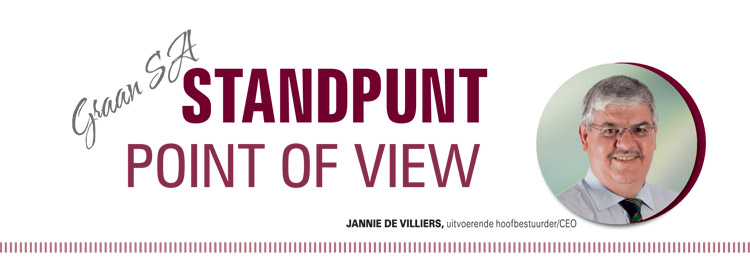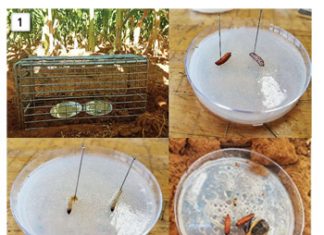June 2017

JANNIE DE VILLIERS, CEO
It is a dusty time of the year. In the south the producers are planting in the dust and in the north harvesting is in full swing.
In Bloemfontein (It’s Time) we literally raised dust whilst praying. In the townships rocks are thrown and fires are started. The one action invests in our future and the other breaks down what has been built up out of frustration about dreams that are not coming true.
All of us are just too aware of the seasons and time for everything, but the dream in our hearts, however, remains that the season in South Africa must change now. I somehow wondered what actually has to happen so that we will not only see the tide turning as a matter of faith, but also in reality.
Maybe a new president; possibly a new government; or perhaps a 4% growth in the economy with lower unemployment? (About South Africa’s rugby we would rather not dream!)
With the surplus of maize this year we asked ourselves two important questions: What can give cause in South Africa that ±400 000 less hectares are planted to maize in the next season – which will take us back to import parity? We thought about another drought, maybe the availability of financing, perhaps only the poor profitability of the commodity or maybe a Zim type of land reform plan.
The other factor that can influence this, leads us to the second question: How many more hectares must be surrendered to soybeans before its price will also gravitate towards export parity? With regards to the latter we are still far off.
The soybeans are faring excellently this year and will definitely draw more attention in the next season. The big injection in the form of new technology for soybeans, however, is still two seasons away.
Wheat planting in the Free State will have to face a big test this year. There are not, like last year, fallow maize fields that have to be planted as the result of the drought. With the low maize price, it can make a few producers think hard.
All of this tells me that producers will have to give much more attention to their marketing strategy before considering the next season’s planting. The winter grains will this season already be able to see the impact of the new resolutions on grade differences, but maybe also have to take into consideration the new wheat tariff.
When writing this article, the new wheat tariff was not yet known. At least not to Grain SA. We, however, noticed that a few people have already started trading wheat as if they have heard in advance what the Minister has decided about the tariff.
I am fully confident that the Regulatory Authorities will investigate this kind of behaviour thoroughly. We are tired of corruption and would like to see it eradicated. When I say eradicated, I think of my mother’s words when we had to weed the vegetable patch: “With root and branch!” Superficial change is short-lived.
This morning I sat reading how a number of well-known journalists who attended NAMPO 2017, reported on agriculture. Oh, it gives one hope that total strangers might change their perception of agriculture and its people – if they would only come to visit and talk to us.
All the international visitors and exhibitors are talking about the peaceful family spirit at NAMPO. I’d like to thank everyone who came to make a contribution to illustrate to the world that there still is hope and there is still peace.
As far as I am concerned one of the highlights was the shift in the debate: Agriculture is seeking its own route for the future. We cannot wait for others to decide for us any longer. They will find us somewhere ahead on the new road. We are now forging ahead!
Publication: June 2017
Section: Features

















